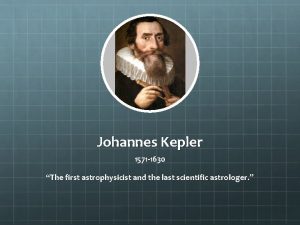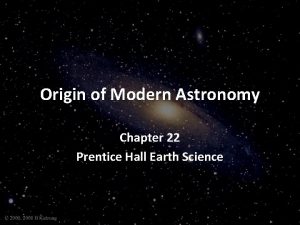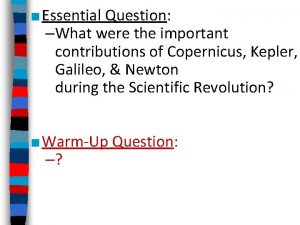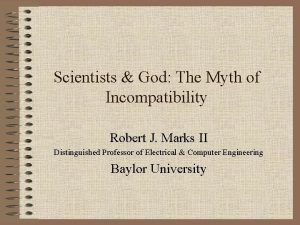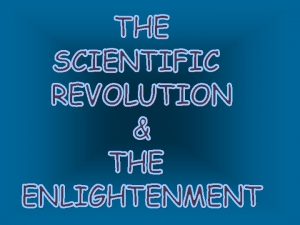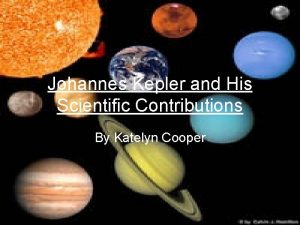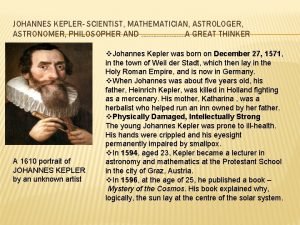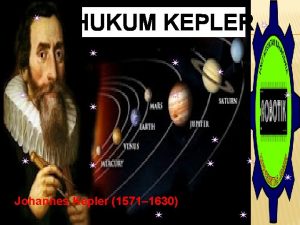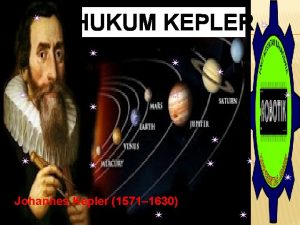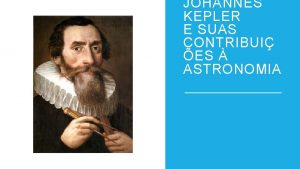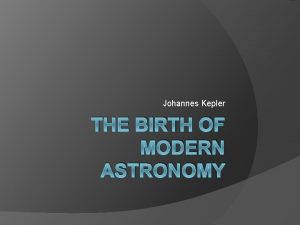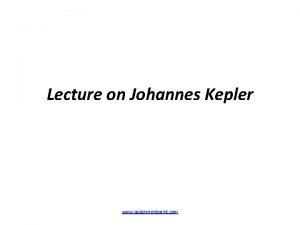Johannes Kepler The Earth Sings Mi Fa Mi











- Slides: 11

Johannes Kepler: The Earth Sings Mi Fa Mi By: Marc Poulin/Helmut

Early Life §Johannes Kepler was born in Weil der Stadt, Germany on December 27 th, 1571. §His father Heinrich Kepler was at most times away from the family fighting some military battle. §His mother Katharine Kepler was not well liked and was a bit of a strange person. She would gather herbs and prepare salves in the belief that she would cure diseases or frighten evil spirits away. §Johannes in all had six brothers and sisters, but only three survived to “mature” years.

Early Life (cont. ) • As a young child Kepler was sick many times. • Kepler was a devout lutheran and remained that way throughout his life even during the reformation. • He originally went to school to become a minister, but the professors saw his talents in math and science and sent him off to study in those fields instead. (also because he was so outspoken about his ideas of the universe, the professors worried that he would include these ideas in his sermons)

Kepler goes to Graz • In 1594 when Kepler was at the University of Tubingen, he received word that there was an opening in Graz for a new math teacher. • His professors let him know that they had recommended him for the position. • Kepler was a bit unsure what to make of this, it was true that he liked Math but he had his mind and heart set on serving God. • In any event the professors convinced him to take the position. While in Graz Kepler started making maps and calendars on the side which gave him a sort of “second career” and led Kepler deeper into numbers and measurements, which ultimately led to Kepler becoming an astronomer.

Theory of Planetary Motion • One of Kepler’s greatest achievements was the development of the Three Laws of Planetary Motion • 1. ) The Law of Ellipses(1609): Each planet follows an elliptical orbit in which the sun sits at one focus of the ellipse • 2. ) The Law of Equal Areas(1609): The radius vector joining a planet and the sun sweeps out an equal area over an equal period of time. • 3. ) The Third law(1618): The squares of the periods of revolution of any two planets are proportional to the cubes of their mean distances from the sun. (There is always a meaningful ratio between any planets distance from the sun and time it takes a planet to orbit the sun)

• In August 2007 TREOS came out with an album entitled The Earth Sings Mi Fa Mi • The album title is based on a theory by Johannes Kepler. • The theory states that each planet produces a tone during its orbit. • He concluded that the tone that the earth was producing was“Mi Fa Mi” He took that further and stated that it stood for Misery Famine and Misery. • Kepler stated that Misery stood for emptiness and that Famine stood not for starvation but for a lust for things. So this is what it’s like What it’s like to disappear With the music of the spheres still ringing in my ear How will I find my way out of this? (excerpt from the song “A REALIZATION OF THE EAR”

Music of the Spheres • What is it? • The ratio of the length of the strings is 1: 2. There a limited number of harmonic tones. • A 2: 3 ratio is a fifth, 3: 4 a fourth, 3: 5 a major third, 5: 8 a minor third, 4: 5 a major sixth, and 5: 6 a minor sixth. • But why these lengths and why are they harmonious with each other? • Harmony was considered to also be the explanation for the distances and spacing of the plantes from the earth; meaning that all the planets would be arranged at certain distances that went along with harmonic intervals. • These harmonious spacings gave notion that there was a “Music of the spheres” • Kepler being the ever questioning man he was, believed that this was all tied to God and math. Math? Yes Math! “Since the Tables require peace, I have abandoned them and turned my mind to developing the Harmony. ” -Johannes Kepler (1618)

Music of the Spheres (cont. ) • swee t

Kepler’s Publications Top-1601: The More Reliable Bases of Astrology 1627: The Rudolphine Tables Bottom Right-1619: Harmonices Mundi libri V (Five books on the harmony of the world. ) Below: Excerpt from the tables.

Kepler’s Publications (cont. ) 1606: De Stella Nova in Pede Serpentarii (The New Star in the Foot of the Serpent Bearer) 1595: Mysterium Cosmographicum Inner portion of Kepler’s model

Sources • www. google. com • Google images • www. myspace. com/thereceivingendofsirens • Voelkel, James, R. Johannes Kepler and the New Astronomy • Copyright 1999 oxford, NY • Connor , James, A. Kepler’s Witch • Copyright 2004 Harpers Ferry, SF • Knight, David, C. Johannes Kepler and Planetary Motion • Copyright 1962 Franklin Watts, Inc. • Britannica V. 6 holderness-krasnogorsk • 15 th ed. Copyright 2005
